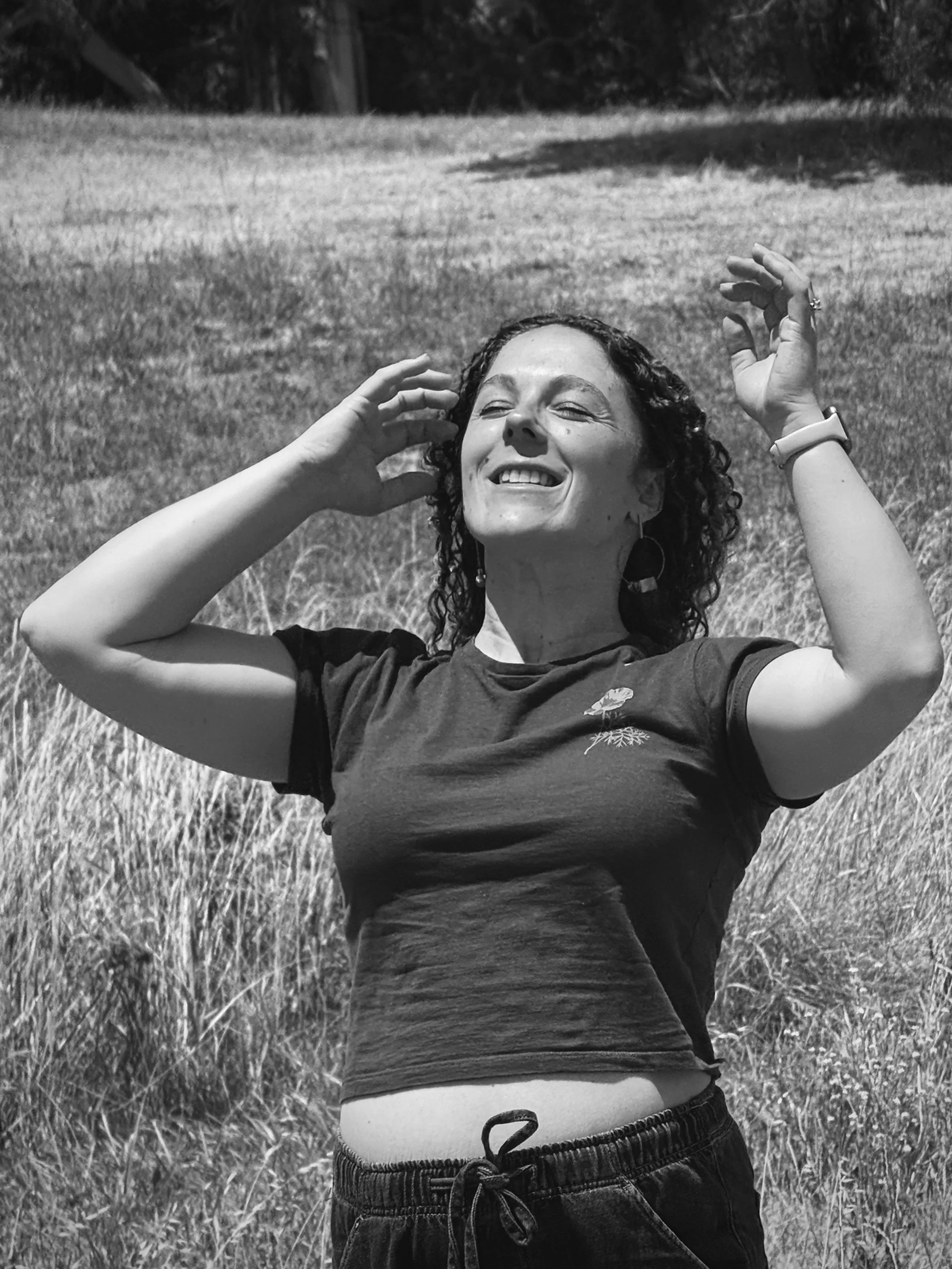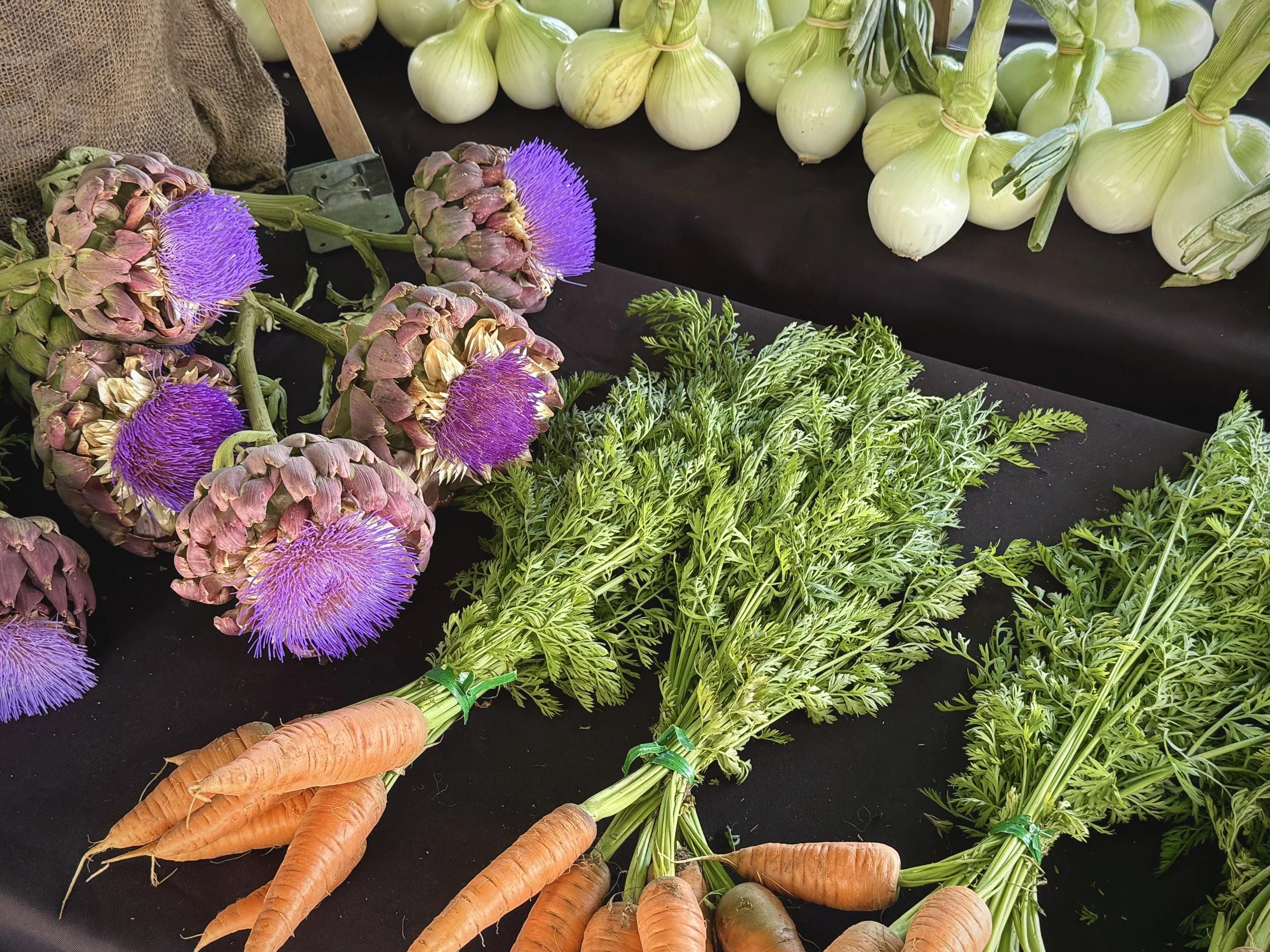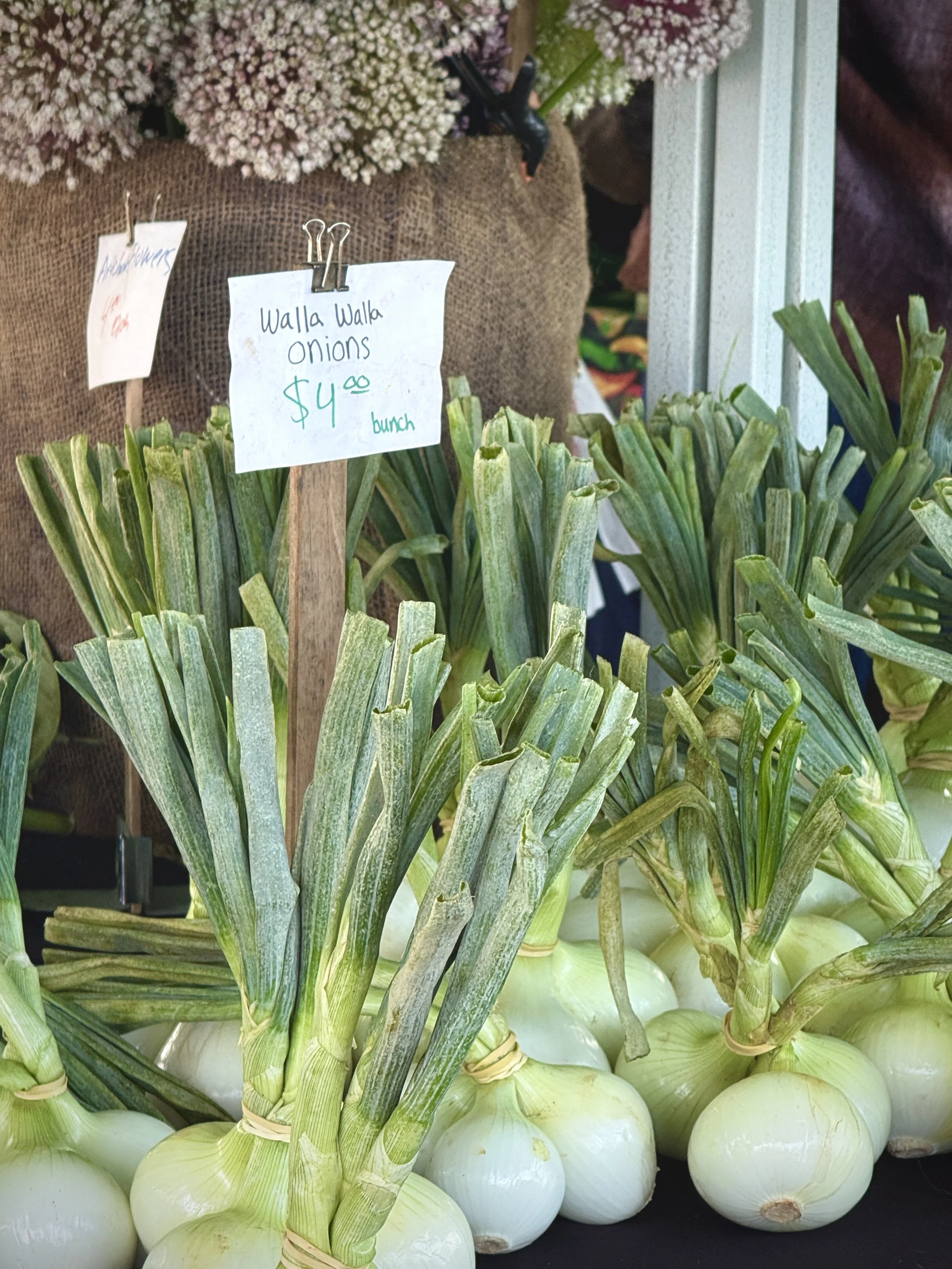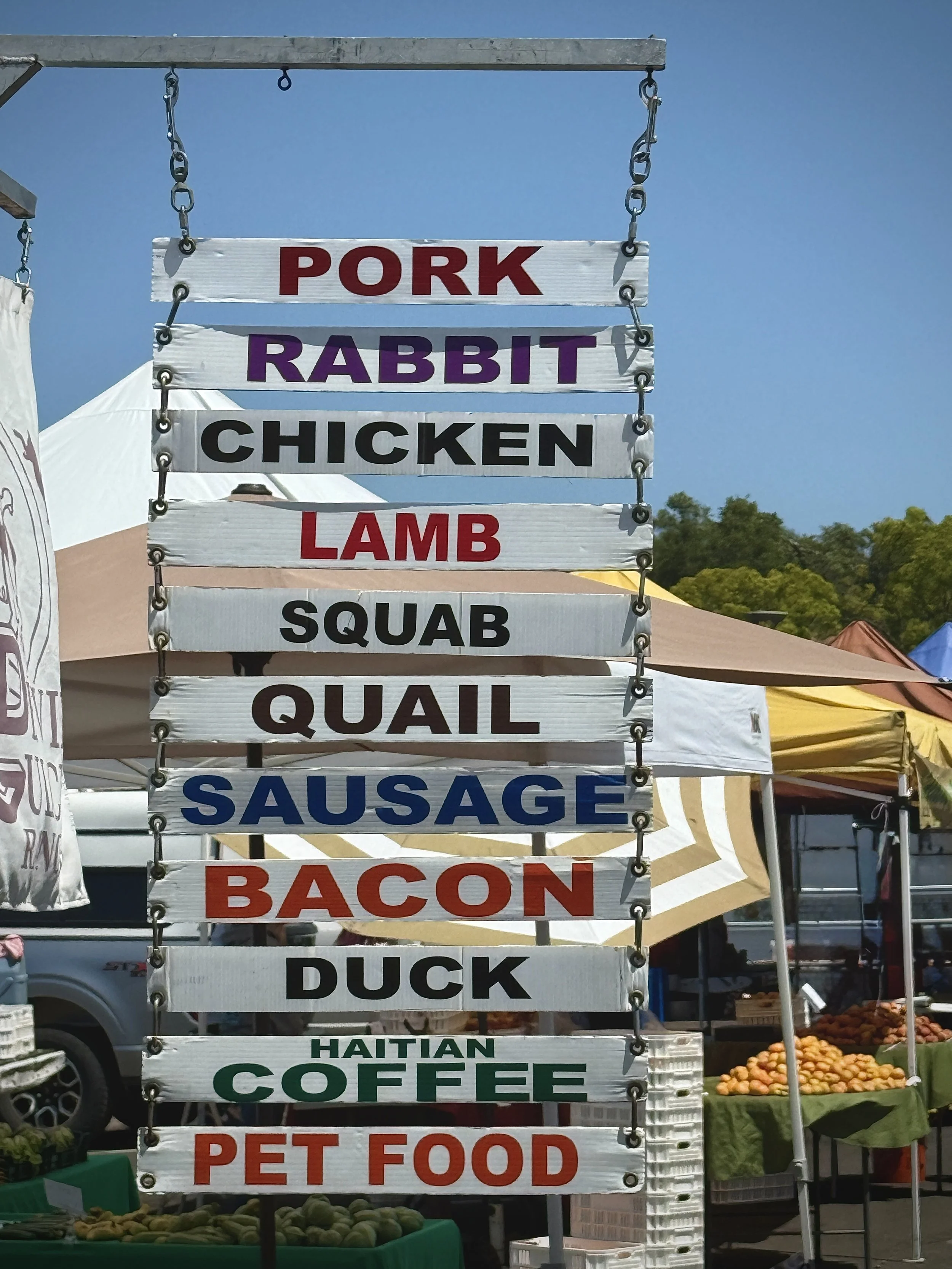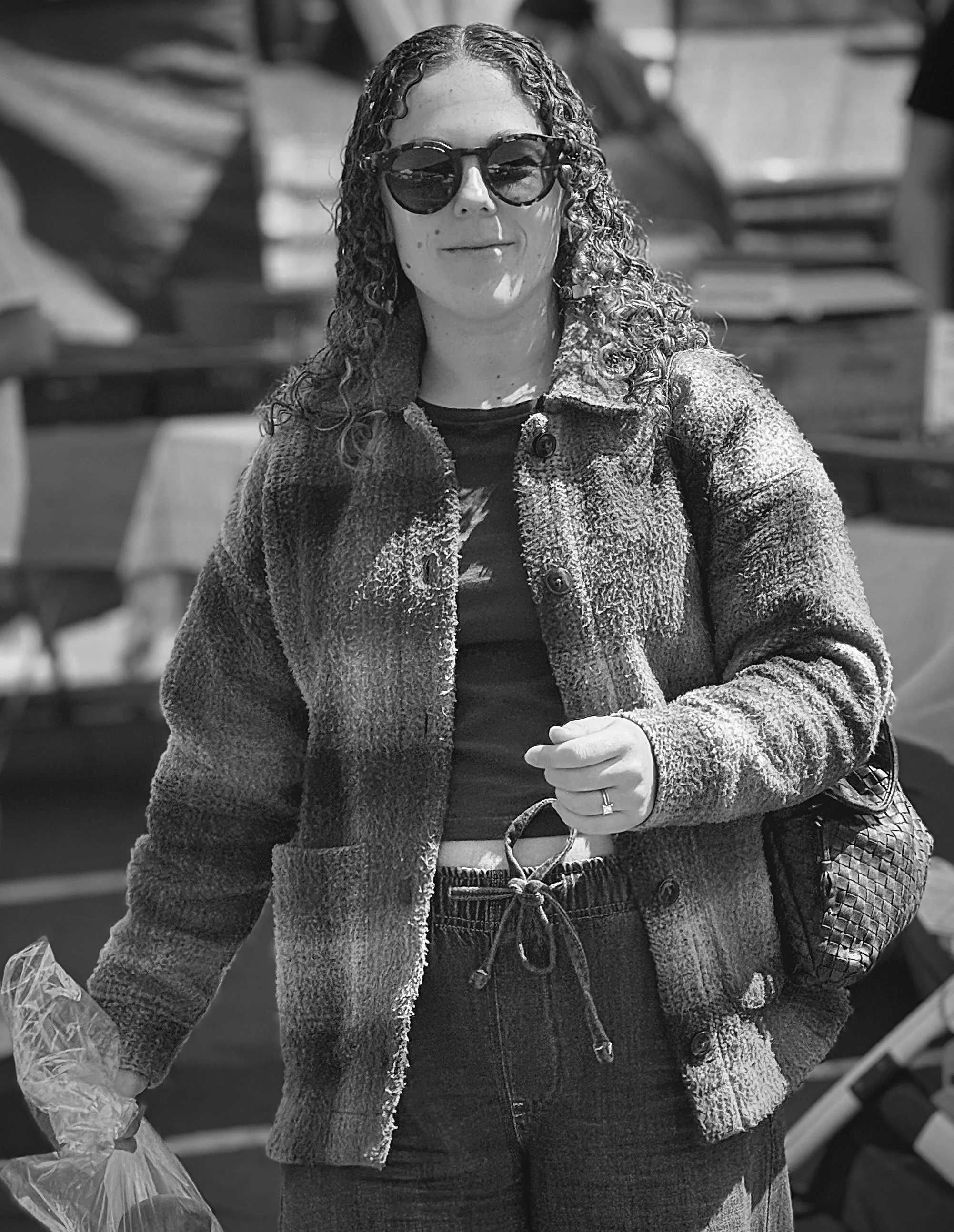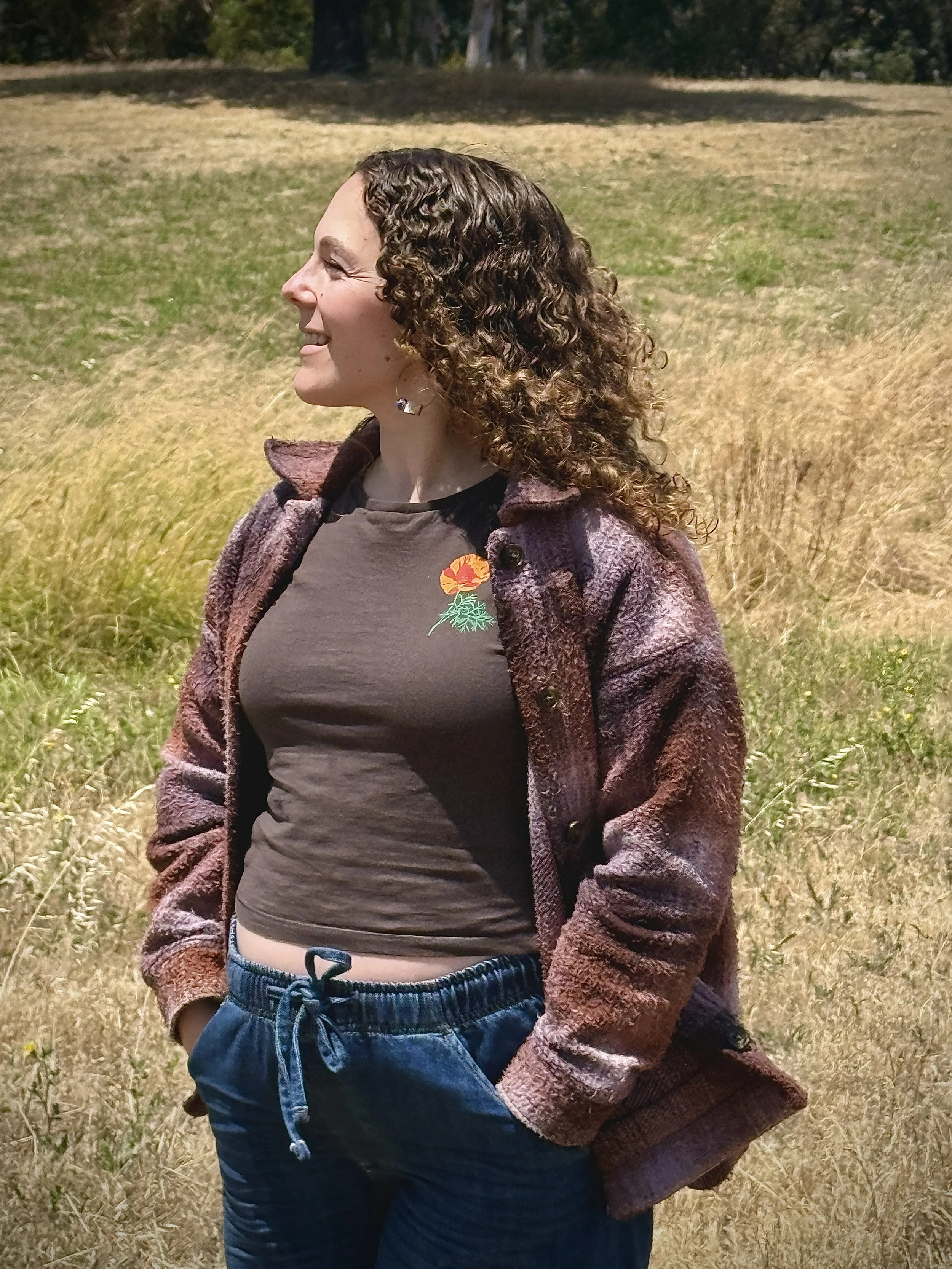Emma Bright
Colossal and formidable is the south tower of the Golden Gate Bridge the morning Emma and I pass the toll plaza on 101. I am struggling to trace the ocean horizon in the distance or even see the tall suspender ropes above us, a sight not uncommon in the early summer, when California is in the throes of the merciless takeover by the Pacific marine layer. It’s a menacing yet breathtaking coup that we get to witness, driving on the bridge on our way to Marin County, where we will first stop by Mill Valley—Emma’s hometown—and then go to San Rafael’s Sunday Marin Farmers’ Market.
Peculiar circularities circumscribe this county, namely that Marin is where Emma spent her childhood, that I met Emma the night I moved to Boston for college, that I ran into Emma the week I moved to California, and that today I am going to the house in which she grew up, where we will say hi to Lisa, Emma’s mom, who has just finished planning a baby shower for Emma who, two months from now, is going to become a mom herself.
“Do you feel ready?” I ask her.
“Oh, man,” she says, “I don’t think I fully processed that I’m having a baby until a couple weeks ago. We’ve obviously been doing all the usual prep, buying all the gear and the stuff we’ll need for the baby, but the mental preparation hit only recently. That was the first time I realized, ‘Oh my god, this baby is a whole human who’s going to show up in the world.’ It’s wild when I think about it.”
“How do you deal with that realization? Are you the type to dive into researching parenthood as much as possible?”
“That’s usually my response because I’m a planner,” Emma notes. “I like to think that if I do this and then I do that, and as long as I stick to the plan and work hard, everything will turn out fine. But I don’t think parenthood is going to be like that, I’m very aware that parenting skills are going to come by doing it. Strangely enough, I’ve actually come to this realization through work. Especially as a manager, you realize you can read all the books, but the best practices come from being a manager. I think being a parent is going to be like that.”
“Very mature,” I add. “I guess the only way to deal with such a big change.”
“I hope so. Right now, I’m just savoring this last bit of freedom—enjoying my daily routine, seeing friends and family, and wrapping things up at work. Because I know I will soon have to let go of the old ways.”
“Speaking of friends and family,” I continue, “tell me a little about Mill Valley, where you grew up. I’ve been at your house for your engagement party, but I don’t think I’ve ever asked you what it was like to grow up there.”
“I was actually bouncing back and forth on whether we should go to Marin or stay in San Francisco,” Emma says. “San Francisco would have been easier and it’s where I live right now, but in the end, I picked Marin because I really love where I grew up. I know not everyone feels that way about their hometown, but for me, Mill Valley—and Marin in general—was perfect. I joke with my parents sometimes that they raised me in a utopia. I get a lot of peace just crossing the bridge.”
It’s easy to see why it felt like a utopia. Surrounded by Mount Tamalpais and Muir Woods on the east and the San Francisco Bay on the west—and San Francisco itself only a half-hour drive away via the Golden Gate Bridge—Mill Valley feels like a pocket of mythical wilderness that accidentally found itself attached to, and often lumped with, one of the country’s leading economic, technological, and cultural metro areas. The contrast is maybe not immediately apparent today, when stratospherically-priced homes and high-end boutiques are just as common in Mill Valley as they are in San Francisco, but only two decades ago, Mill Valley was a live reincarnation of Stars Hollow from Gilmore Girls.
“Back in the nineties,” Emma adds, “when I was just a kid, Mill Valley had this hippie culture that grounded it. To be fair, the town always had pockets of wealth because it is such a beautiful place—people want to live there, build these beautiful homes—but you still found a lot of older hippies in tie-dye shirts, hanging out downtown, so it really felt like I was living somewhere where the culture of the sixties never went away. Even though it changed, I do think you still see a lot of those activist and artistic traits in the town’s DNA.”
Some of that idyllic upbringing was due to Emma’s parents as well. She says she would not describe them as full-on hippies but that she thinks they still embodied the counter culture of this area. Her dad was very involved in the anti-Vietnam War protests when he was a student at UC Berkeley and her mom left Seattle, where she grew up, because she wanted to be in San Francisco as an art student.
“So, they weren’t like the infamously intense Bay Area parents?” I ask.
“No, not at all. They were both chill, easygoing, and not overly strict. I didn’t feel academic pressure the way my friends from Menlo Park did, where it felt like every parent was gunning to get their kid into Stanford. I think they cared that my brother and I were well-rounded, but they never emphasized being competitive for the sake of being competitive.”
“So, do you think you’re similar to them in any way?”
“I think so,” Emma says. “Even though people say I look physically more like my dad, I see pieces of myself in both of them. Like my mom, I like doing things with my hands, being creative, building and designing things—I think these were the traits that made me a mechanical engineer. From my dad, I think I inherited his persistence and his entrepreneurial mindset, traits that helped me get to where I am in my career today.”
It was a synergistic effect, one that made Emma a dedicated, hard-working kid who cared deeply about doing the right thing in an effective way. Passionate about environmental sustainability and embedded in grassroots activism even as a teenager, she organized conferences and led school projects aimed at reducing food waste through composting, something that is normalized today but was almost radical back then.
“It’s funny you mention that,” I say, “because that’s perhaps the most distinct memory I have of you when we met as freshmen in college. I remember you baking in the kitchen, in our dorm, and being precise about how much food was needed or being careful about what was recyclable. Most of us didn’t care.”
She laughs.
“Yeah, definitely. College was really the first time that I was able to see how Marin’s culture reinforced these habits early for me, when in many other places, people don’t start learning about these nuances until adulthood, when they are living on their own.”
When we reach Emma’s old house in the hills of Mill Valley, her mom comes out on the porch and waves. She has been safeguarding a few packages Emma ordered to the Mill Valley house instead of her San Francisco apartment, a practical decision that doubles as an excuse for Emma and her mom to hang out.
There is indeed a similarity between them even though they do not look much alike. Both unhurried and observant, they are at once attuned to our conversation and detached from any expectation of what the conversation needs to be. At some point, I—probably conditioned by the many milestone-hunting type-A folks I had met in the Bay Area over the years—ask Lisa if she is excited that she will be a grandmother soon.
“Oh,” she says and smiles, looking at Emma. “I am just happy that she gets to be a parent. That’s what’s most important.”
𐫱
The Sunday Marin Farmers’ Market in San Rafael, the county’s staple community is only a fifteen minute drive from Mill Valley. Emma tells me she came here often when she was growing up because she cared deeply about environmental sustainability and believed that she could change the world by supporting local farmers. Her view of sustainability is not black-and-white anymore, she tells me, but she still prefers to support local producers and vendors. She even knows a few people here and tells me we will need to stop by Saffa Home Foods, a Persian-cuisine vendor run by her friend’s mom.
Whatever nuanced view Emma developed about sustainability did not impact the strength of her passion. Today, she is the Head of Product Design Engineering at Mill, a San Francisco-based tech company that makes smart odorless food recyclers: bins that shred, shrink, and dehydrate food scraps—from fruits and veggies to pits and bones—and turn them into grounds that can be used to feed chickens or enrich small-farm soils. She joined five years ago, when the company was founded, and has been instrumental in helping get the product and the business off the ground.
But even today, Emma is unafraid to admit that her career path was not frictionless. She initially struggled with her decision to become an engineer, which I had witnessed because I was going through the same struggle at the same time in the same place. It’s how we became close as freshmen in college: both Emma and I had to take the really introductory classical mechanics course, designed for students who needed more time to ease into college-level physics.
“Mechanical engineering didn’t come naturally to me,” she says. “I remember, in that physics class, when it felt like things would never click, I just remember telling myself that I had to keep going and that I would eventually get better at it. Maybe it was a naive approach, but it did work out ultimately, even if it took way longer than I thought it would.”
After graduating, Emma began her career at Fitbit, where she worked for two years before moving to Nest, where she then worked for three years as a Product Design Engineer on flagship products like the Google Nest Doorbell and the Nest Temperature Sensor. It was at Nest, six years after sitting in that physics class as a college freshman, that Emma began to feel that things were falling into place. She began to see that she was not an imposter.
“I would say that Nest was the first place where I could spread my wings,” she notes. “Projects and responsibilities were thrown into my lap, and because I was still questioning my skills, I was determined to prove to everyone, and to myself, that I could do it. Which I did, and that helped a lot.”
“So you would say that working at Nest was where you grew into yourself professionally?”
“Actually,” Emma says, “I would say that it didn’t happen until I joined Mill. Nest was part of Google, which was a big company, and at big companies, the infrastructure tells you whether you’re doing a good job. At a startup like Mill, I had to figure out how to find those signals myself and how to stay motivated. I realized no one was going to give me that confidence other than myself.”
The confidence boost also came from becoming a manager two years ago, a shift that created an unexplored playground for Emma to stretch her comfort with disagreement, conflict, and decision-making.
“I’m very conflict-averse by nature, so being at a startup for this long really forced me to get comfortable with disagreement and conflict, both when working with other teams and managing my own team. A startup is like a rollercoaster—decisions have to be quick and often have to change on the spot, so it’s really impractical to stay quiet and not voice your opinion. It’s fine if people want different things; what we have to do is figure out how to move forward. That made me a lot tougher.”
“Is it okay if I push on that just a little further,” I say, “because I’m curious what the connection is between being a manager, becoming more comfortable with conflict, and becoming more confident?”
“I think it was all about progression,” Emma clarifies. “I first became better at navigating disagreements and conflicts, and I think that made me much more valuable to my team, which gave me confidence because I saw how much more value I could add to the business. As a manager, I actually think that a big part of my job is helping people get comfortable with conflict. Teams panic when they disagree, just like I used to before, and my job now is to help them find the overlap and show that disagreement is healthy when building a product.”
“Interesting. Sounds like the startup lifestyle actually made you more optimistic?”
“Oh, for sure,” she says and laughs. “I used to assume the worst-case scenario in every project; now I’m more likely to think, ‘This could actually work.’ I still have my moments, but I’m definitely more positive than before.”
Maternity leave will be the first time Emma takes a break—well, professional break, at least—from the high-intensity career she had been in for the last ten years. It’s a long spellbound stretch, one from which it can be hard to detach, but she is proud to see how far she got, judging not by her individual projects but by the level of empowerment her team at Mill now feels. Seeing that, she says, in an inherently chaotic startup environment is what gives her joy.
“I know this is the last thing on your mind right now,” I add, “but where do you see yourself in ten or twenty years? Do you think your career will continue in this direction?”
“I honestly don’t have the slightest clue what the future could hold,” she says, “but if there’s one thing that I’ve learned, it’s that a lot of my career has been about taking advantage of opportunities that came up—even the ones I didn’t plan for. So, whether it’s CTO of a consumer-product company someday or something more hands-on in another industry, I am open to whatever comes. But what I do know is that I don’t want to coast. I need to feel challenged.“
𐫱
On our way back to San Francisco in the afternoon, the north tower of the Golden Gate Bridge is the first to appear. In and out it comes, out of the striking vista, the impermanent frame repeatedly formed and deformed by the Marin Hills and the bright blue sky, until we reach a point high enough on 101 to see the majestic panorama of the bridge, the ocean, and the city in its entirety. Not a single cloud is dotted across the sky, and the Pacific, free from the reigns of Karl the Fog, is now glistening.
Three years ago, the ocean unexpectedly became a beacon of solace for Emma. She had just had a miscarriage, which shattered her perception of life as something that could be controlled, and was finding it hard to not think about the experience. Zack, Emma’s husband, who knew how much of a dog person Emma was, found out that a dog-surfing competition was happening in Pacifica. They went, enjoyed the quirky competition, and, while walking on the beach, ran into one of Emma’s friends whom she had not seen in a while.
“She asked if I was interested in surfing,” Emma notes, “and if I would join her sometime. Surfing was not something I ever thought about; it was just something I always ruled out from the start because I thought I wouldn’t like it.”
“But you went?”
“I did,” she continues. “Denis, the first time I went, I was pummeled. And, it’s not like I was someone who was frail and unprepared physically. I had been weightlifting since high school so I always had upper body strength. But I barely caught any waves that day. I was truly humbled by the ocean. And I loved it.”
Emma became a surfer after this experience. For the past few years, she often started her day at 5:30 a.m. on both weekdays and weekends to drive to Pacifica, where for two hours she patiently waited for and rode the ocean’s waves. Last year, she even traveled to Indonesia for a surfing trip.
“Surfing gave me so much peace,” she adds. “When you’re at the ocean’s border, waiting for these waves created by storms happening far, far away, you realize how drastic and unpredictable nature is. I always liked being in control, but with the ocean, the only thing I could do was focus and wait for the right moment to come. The ocean gives and takes at its own pace. It’s very poetic in that way.”
“I had no idea that’s how it all started,” I say. “What about these past few months, now that you’re pregnant? Did you find a good substitute for surfing?”
“Lately I’ve been getting into knitting. It’s not the same obviously, but it has been a good escape.” She pauses and laughs. “Of course, I immediately jumped straight into knitting advanced patterns. I don’t think I ever had the illusion that I would knit all my clothes, but now that I am able to do it myself, I want to tweak it, adjust it, and make it exactly how I want it. I guess that’s the control freak in me."
This unceasing war with control might be unholy but it’s what gives Emma a refined edge: an unwavering pursuit of excellence and thoughtfulness in everything that she does, be it a banana bread that she baked for me when I was sick or the many excellent parties she and Zack hosted over the years. What was always apparent was her dedication to not cut corners, to not settle for something just because it’s available and out there. If we were eating a pizza, then we were eating a homemade one. If we were having cocktails, then we were having homecrafted ones.
“That’s one of the things I love about hanging out with you and Zack,” I add, “how intentional you both are, especially with the parties you guys have been throwing. There’s always some level of artistry involved: the setup, your food, the movies Zack chooses—it’s all really considered. Was that something you two recognized in each other early on?”
“Totally,” Emma says. “We’ve always loved collaborating on what we call ‘projects,’ and hosting has become our main one. It’s creative, it brings people together, and each time we learn something new in the process. I quite like the idea of having a ‘signature’ something, as in something I’m known for. Zack, I feel, is known for his selection of movies. He knows of and is excited to share a whole archive of subgenres I’d never even heard of, like giallo. With me, it’s more about the food I make, like the pizzas I had been perfecting with each party. And probably mixology for both of us, we love making good cocktails and mocktails.”
“I always admired that about you,” I say. “Your joie de vivre, I guess.”
“I’ve actually talked about this with my dad,” she notes. “We agreed I am selectively picky. There are things I’ll happily be very basic about, but when it comes to experiences like hosting a movie night, or spending time with friends, or having food and drinks, I want to do it well. I want to use those moments to learn something, to craft something new. I always felt—even though I’m still young—that life is short. So if you can, why not treat every day like an opportunity to do something special for yourself and for others, even if it’s something small?”
I ask her if she would ever consider turning her enjoyment of life into something that could pay the bills, like the sourdough micro-bakery she started during the pandemic.
“That was such a fun period,” she says. “I would drive around delivering loaves, meeting total strangers, hearing little snippets of their lives. I remember this woman telling me how much her husband loved sourdough and she wanted to surprise him with seven loaves of bread. I got these small glimpses into people’s worlds, which was incredibly wholesome. Plus, there's something satisfying about working with your hands and doing something essential, like feeding people. It feels really connected to the basics of life.”
“But?”
“But,” she says, laughing. “The thing is I genuinely love what I do, and I’ve been very happy with my career. I don’t spend much time fantasizing about other paths. I think I also enjoy having these creative outlets free from the pressure of monetization. It feels special that way.”
I point to cargo ships in the distance and tell Emma how much I love looking at their crisp silhouettes on a bright cloudless day, when golden glints on the ocean’s surface give these merchant ships a mythical feel. Emma smiles and tells me that her son’s nursery—most of it painted by her mom—is entirely ocean-themed, a comment that I don’t register as particularly relevant to her story until the moment it surfaces as the first image in my mind when Emma texts me, three months later, to share the news that the Bright household welcomed its newest member.




